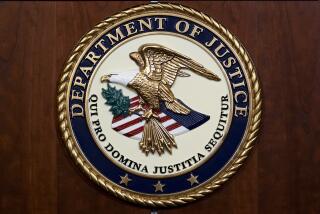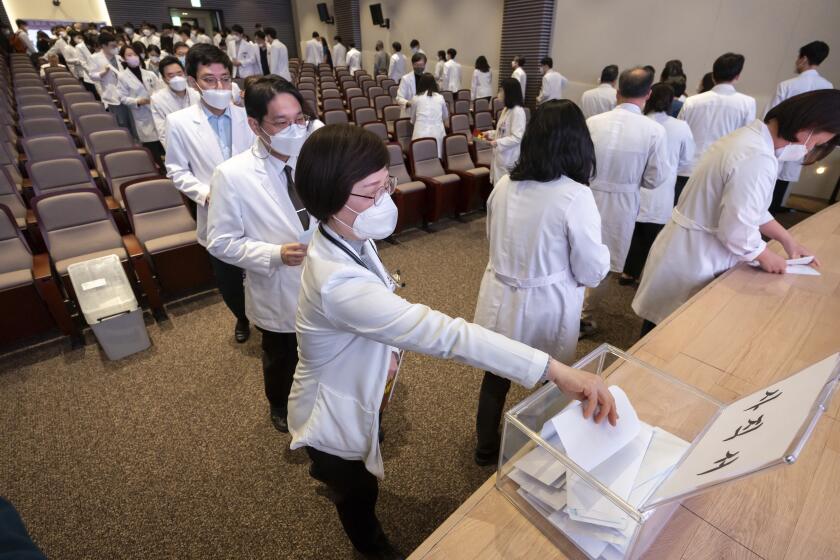Did the fast-food industry play these Nobel economists for suckers? (Updated)
[This post has been updated, as explained below.]
The restaurant industry’s opposition to a higher minimum wage is hardly a secret--it’s one of the top issues on the lobbying agenda of the National Restaurant Assn., the chain restaurants’ Washington trade group.
The mystery is why the industry seemed so loath to reveal its role in a round-robin letter signed by more than 500 economists, including four Nobel laureates, calling the proposed minimum-wage hike to $10.10 an hour a “poorly targeted anti-poverty measure.”
The letter was passed around during the last few weeks as “a message from Vernon L. Smith,” a conservative economist and Nobel laureate at Chapman University in Orange. Smith asked recipients to “consider signing the statement” and cited 150 economists already on board. The message from Smith didn’t identify the letter’s sponsor. It did refer recipients to the letter’s text at economistletter.com, and bore a Pennsylvania Avenue address in Washington.
The letter plainly was designed to counterbalance a round-robin letter signed by 600 economists who support the minimum wage hike. That letter was openly sponsored by the Economic Policy Institute, a progressive think tank supported by organized labor; the EPI held a public event to release it in January, and still posts the event video on its website.
The restaurant lobby wasn’t quite so upfront. As it turned out, the registrant of the economistletter.com website is the Washington lobbying firm Urban Swirski. The Washington address is theirs, too. And the National Restaurant Assn. is their client.
Putting the pieces together took the combined efforts of Jonathan Andreas, a blogger and economist at Bluffton University in Ohio, who received the come-on, and Peter Coy of BusinessWeek, who chased down lobbyist Sandra Swirski and obtained her acknowledgment that the restaurant group was behind the effort.
There are no indications that Smith or the other signatories were swayed by the restaurant lobby’s role in the letter. Smith, whose conservative credentials are rock solid, firmly believes that raising the minimum wage is a bad idea. “I know nothing about the National Restaurant Association, but that would not change my opposition to the minimum wage increase,” he told us via an email passed on by Chapman University.
Smith said he was approached to join the letter campaign by James Carter, a politically active economist who has served as an advisor to Republicans in Congress as well as the Clinton administration. Smith told Carter, when the latter asked his advice on drafting and distributing the latter, that he was “entirely sympathetic to opposing the wage increase.”
[Smith, in a supplemental email to us, says he expanded on his views to Carter as follows: “I believe the minimum wage has greatly reduced our ability to compete effectively with import products, and has reduced the domestic demand for young entry level workers--particularly blacks, high school dropouts and college dropouts in that order who need to acquire habits of work, earning and building their future.”
He said he supports “an incomes proportional supplement at the lower wages for those below the poverty line,” an assistance policy that “counters those who say we are not compassionate.” Such a program, he adds, “should substitute for other welfare programs, and lowers their public cost.”
Smith further told us, “I have always been grateful that I was able to go to work at age 12 in 1939 delivering on my bicycle for the local West Side Drug store for 50 cents, 6pm-12pm, six days a week; that is about 8 cents an hour, and I was happy to get the job and get started in the work force. No one said you can’t do this because its below min wage and besides you are too young!”]
Chapman’s chancellor, Daniele Struppa, said in an email that the university was “thrilled” to see Smith quoted in the New York Times to the effect that he was “only interested in the ideas and the content” of the letter.
He continued, “This is why he is such a wonderful role models [sic] for all academics.... What an (unfortunately) rare point of view. Allelujah, and kudos to Vernon.”
Well, Chapman University had to say that, didn’t they? Otherwise they might be embarrassed that a high-profile faculty member was shown to be carrying water unwittingly for an industry lobby that took pains to conceal its own part in the campaign--even though, as he states above, there was no conflict between his own views and that of the National Restaurant Association. Smith, by the bye, was a high-profile “get” for Chapman in 2007 when he and three members of his team were hired away from Virginia’s George Mason University.
As for the dueling letters, we would observe that the letter favoring the minimum wage increase is a full-throated defense of the increase, citing research “showing that increases in the minimum wage have had little or no negative effect on the employment of minimum-wage workers, even during times of weakness in the labor market,” and observing that the increase would directly or indirectly increase wages for as many as 28 million low-wage workers.
The letter opposing the increase calls for “a comprehensive and thoughtful solution [to poverty] that targets those Americans actually in need.” But it doesn’t say what that solution should encompass. It also gives a rather incomplete citation of the recent Congressional Budget Office report on the impact of the proposed minimum-wage increase.
It’s true, as the letter states, that the CBO found that raising the wage might cost the economy 500,000 jobs by 2016. What it doesn’t say is that the CBO acknowledged that its jobs figure was soft (it could be 1 million jobs, or no jobs) but that overall the increase would lift 900,000 households out of poverty and raise incomes by more than $17 billion.
In any case, if you’re counting, seven Nobel laureates signed the EPI’s pro-hike letter, and four signed the restaurant lobby’s opposition. The pro-hike economists included five from UCLA and two from USC; the anti side notched four from UCLA and five from USC. Chapman’s economics faculty lined up 2 to 1 against the minimum wage increase.
More to Read
Sign up for Essential California
The most important California stories and recommendations in your inbox every morning.
You may occasionally receive promotional content from the Los Angeles Times.











